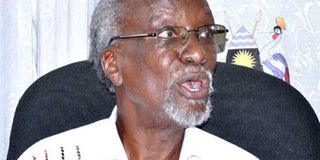EAC leaders to fast-track political federation

Third Deputy Prime Minister and Minister for East African Affairs, Kirunda Kivejinja. File photo
What you need to know:
- Those challenges, he said, are however being addressed through among others sensitization, policy formulation and negotiations.
- The member of the historical command of the NRM was however quick to point out that despite the optimism about the future, the process of integration is ridden with challenges especially in the area of infrastructural development.
KAMPALA
The leaders of member states of the East African Community have renewed their push for political federation and called upon the citizens in the five member states to support the fast-tracking of the protocol.
This was revealed on Tuesday by the third Deputy Prime Minister and Minister for East African Affairs, Kirunda Kivejinja, while presenting a paper titled, “Trials and Triumphs of the East African Community” at the African Platform of the Ghent University Association in Belgium.
“Efforts have been made to consult the citizens of East Africa and results from the consultation processes indicate that 80 per cent of East Africans support the idea of a political federation. This is being given due attention and we hope we shall succeed to have a sustainable Federated East African Community” he said.
Mr Kirunda, said that the East African Community had collapsed in 1977 largely on account of failure by the leaders of the time to involve the public, civil society and the business community a scenario which the current crop of leaders are working hard to avoid.
The member of the historical command of the NRM was however quick to point out that despite the optimism about the future, the process of integration is ridden with challenges especially in the area of infrastructural development.
“The state of our physical infrastructure erodes the region’s competitiveness and its attractiveness to serious local and foreign investment, but we are addressing this challenge. We have put in place a well-developed master-plan for railways, roads and energy, all of them from a regional perspective,” he said.
He listed other challenges as fears of loss of sovereignty and attendant notions of loss of political and decision making power, emergence of new tariffs at a time when Nontariff Barriers (NTBs) had been eliminated, and the decision by certain members states of the community to insist on being members in more than one regional grouping.
Those challenges, he said, are however being addressed through among others sensitization, policy formulation and negotiations.



